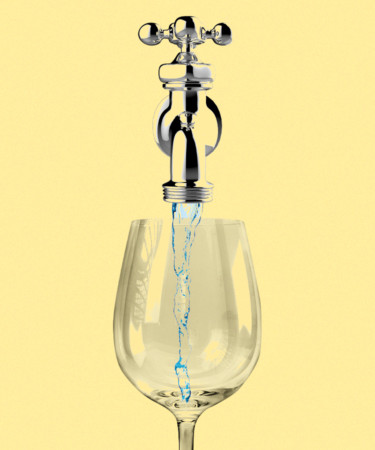When it comes to wine tasting, there are a lot of unspoken rules: Don’t wear strongly scented perfumes or colognes; do be open-minded. It’s all complicated enough that navigating one, whether it’s a casual affair with friends or slightly more serious, can feel like a complicated balancing act of etiquette and enjoyment.
Regardless of the setting, there is one rule you should be following in order to get the most from the wines you’re tasting: the wine rinse in between pours. If you’re enjoying a casual tasting, you may be silently wondering why you’re wasting precious wine rinsing the glass. For expert guidance on this wine washout, we spoke to sommelier and wine educator, Brianne Cohen.
Why You Need to Rinse Your Wine Glass Between Pours
Cleaning the glass when moving from white to red probably seems like the most logical reason behind rinsing. But aside from preventing a color change of the new pour, there are a few other benefits to washing out the glass. For example, corked wines and wines with strong aromas and flavors (like natural wines) can stay in the glass and affect the taste of the next wine, Cohen notes. Sediment from unfiltered and aged wines is also another reason to rinse, as these will transfer to the next wine if left in the glass.
How to Rinse
There is an art to rinsing, and it begins and ends with wine. After you’ve finished your initial glass and are ready to move on, you’ll want to rinse the glass with the upcoming wine in the lineup. Cohen suggests first pouring a small teaspoon amount of the wine into your glass before swirling it clockwise and upward to coat the glass, before dumping it out. “Swirling is key, as it will remove residue from the sides of the glass and most importantly charges, or primes, the glass for the next wine,” she says. Essentially you’re seasoning the glass pre-pour to ensure you’re getting only the notes from the current wine, and none from the previous pour.
Why You Shouldn’t Use Water
Given the bowl shape of wine glasses and the impact of gravity, any liquid left in your glass will pool at the bottom. So, it goes without saying that when rinsing with water there will inevitably be residual traces left behind. Even the smallest amount of water can dilute the wine, which can alter the way it tastes, looks, or even smells. But Cohen explains that the major issue with using water to rinse comes from its quality. “Variations of water, such as hard, mineral, and chemical can impart additional flavors into the wine,” she says.
Ultimately, you want the glass to be as ready as possible for each wine you’re tasting. Rinsing with wine, not water, is the best way to make sure you’re getting all that each wine has to offer.
